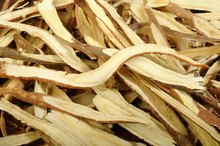Side Effects of the NAC Supplement
N-Acetylcysteine -- abbreviated NAC -- is a supplement derived from a protein-building amino acid called cysteine. If you have cancer, HIV/AIDS or liver damage due to a drug overdose, you may benefit from treatment with NAC supplements. This supplement may also improve lung function in people with chronic obstructive pulmonary disorders or bronchitis, although clear evidence supporting the purported uses of NAC supplements is lacking. Talk with your primary medical provider about the side effects of NAC supplements before beginning treatment.
Stomach Irritation
The most common side effects associated with orally-administered NAC supplements are stomach-related. You may feel nauseated, vomit or develop diarrhea or constipation, RxList warns. These side effects may contribute to loss of appetite, stomach cramps or bloating. Avoid taking this supplement on an empty stomach to limit or prevent stomach irritation. If stomach discomfort persists, seek additional care from your physician.
- The most common side effects associated with orally-administered NAC supplements are stomach-related.
- Avoid taking this supplement on an empty stomach to limit or prevent stomach irritation.
Skin Rash
CLA Side Effects
Learn More
Irritated patches of skin may appear across your body as a side effect following treatment with NAC supplements. Skin rash side effects may be bothersome and may cause itching, peeling or flaking of the affected skin region. Contact your medical provider immediately if you develop hives, excessive swelling or intense itching, as these side effects may be signs of an allergic reaction to NAC supplements.
Fatigue
You may feel unusually fatigued while receiving treatment with NAC supplements, Memorial Sloan-Kettering Cancer Center (MSKCC) reports. Increased fatigue may negatively affect your ability to remain alert and attentive during your daily activities. If fatigue becomes bothersome, consult your doctor.
Decreased Blood Pressure
Sulphur Supplement Side Effects
Learn More
Your blood pressure may drop as a side effect of taking this type of supplement. Low blood pressure -- also called hypotension -- may cause symptoms of headache, dizziness or fatigue. If you feel dizzy, remain seated until this sensations passes to prevent further injury from falling down or tripping. Talk with your physician if dizziness does not subside.
- Your blood pressure may drop as a side effect of taking this type of supplement.
Severe Allergic Reaction
A severe allergic reaction, called an anaphylactoid reaction, may occur after initial treatment with NAC supplements, Drugs.com warns. An anaphylactoid reaction may result in severe breathing problems, difficulty swallowing, facial swelling, hives, weakness, dizziness or pale skin. Seek emergency medical care if you exhibit any of these symptoms after taking a NAC supplement. In the absence of prompt medical intervention, an anaphylactoid reaction may be fatal.
- A severe allergic reaction, called an anaphylactoid reaction, may occur after initial treatment with NAC supplements, Drugs.com warns.
Medication Interactions
Be sure to discuss any medications you are currently taking with your medical provider before you begin treatment with NAC supplement. Concomitant use of NAC supplements and nitroglycerine may cause a severe drop in your blood pressure and may increase your risk of experiencing headache pain and lightheadedness, MSKCC reports. Additionally, the efficacy of activated charcoal may diminish if you take it in conjunction with a NAC supplement.
Related Articles
References
Writer Bio
Rae Uddin has worked as a freelance writer and editor since 2004. She specializes in scientific journalism and medical and technical writing. Her work has appeared in various online publications. Uddin earned her Master of Science in integrated biomedical sciences with an emphasis in molecular and cellular biochemistry from the University of Kentucky College of Medicine.









